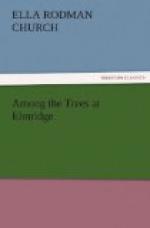“But only as you do when you are out in it,” replied his governess—“by having the water drip from your clothes.—No, Clara, the tree is called ‘weeping’ because it seems to ’assume the attitude of a person in tears, who bends over and appears to droop.’ The sprays of this tree are particularly beautiful, and ‘willowy’ is often used for ‘graceful,’ as meaning the same thing. Its language is ‘sorrow,’ and it is often seen in burial-grounds and in mourning-pictures. ’We remember it in sacred history, associating it with the rivers of Babylon, and with the tears of the children of Israel, who sat down under the shade of this tree and hung their harps upon its branches. It is distinguished by the graceful beauty of its outlines, its light-green, delicate foliage, its sorrowing attitude and its flowing drapery.’”
“Were those weeping willows that we saw to-day?” asked Clara.
“No,” replied her brother, quickly; “they just stuck up straight and didn’t weep a bit.”
“They are called water willows,” said Miss Harson, “because they are never found in dry places. They are more common than the weeping willow. The water willow has the same delicate foliage and the same habit, under an April sky, of gleaming with a drapery of golden verdure among the still-naked trees of the forest or orchard. ’When Spring has closed her delicate flowers,’ says a bright writer, ’and the multitudes that crowd around the footsteps of May have yielded their places to the brighter host of June, the willow scatters the golden aments that adorned it, and appears in the deeper garniture of its own green foliage.’ A group of these golden willows, seen in a rainstorm, will have so bright an appearance as to make it seem as if the sun were actually shining.”
[Illustration: The white willow (Salix alba).]
“I wish we had them all around here, then,” said Edith; “I like to see the sun shining when it rains.”
“But the sun is not shining, dear,” replied her governess: “it is only the reflection from the willows that makes it look so; and we can make just such sunshine ourselves when it rains, or when there is dullness of any sort, by being all the more cheerful and striving to make others happy. Who loves to be called ’Little Sunshine’?”
“I do,” said the child, caressing the hand that had patted her rosy cheek.
“Let’s all be golden willows,” said Malcolm, in a comical way that made them laugh.
Miss Harson told him that he could not make a better attempt than to be one of those home-brighteners who bring the sunshine with them, but she added that such people are always considerate for others. Malcolm wondered a little if this meant that he was not, but he soon forgot it in hearing the many things that were to be said of the willow.




